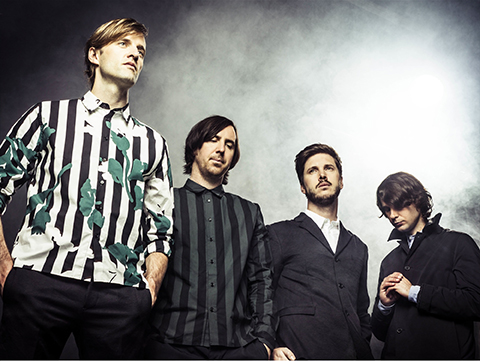
The Australian group Cut Copy is on its fourth album, Free Your Mind, cemented with their patented filtering of electronics to create a decidedly indie pop confections made for dancing and movement. On the album, Cut Copy’s special brand of dense electronic layers keep their past albums’ danceability strongly in place, but the structures of their songs are even more defined, with more self-sufficiency and internal references. While working on Free Your Mind, central figure Dan Whitford started noticing parallels between the first summer of love circa 1967 and the second one 20 years later. Not so much musically; the former was psychedelic rock and the latter acid house, but in the sense that those moments in history fostered community. This is also Cut Copy’s intention with Free Your Mind.
“When we started the process of this record we had a basic approach of starting a different idea every day. Wherever it got to at the end of that day, we’d start something new the next day,” says Tim Hoey, Cut Copy’s guitarist and sampler wrangler. “We began to think in terms of ‘free your mind’ throughout three or four of the tracks, expanding on the idea and began to recording around this theme.”
Shepherded by Dave Fridman (MGMT, Flaming Lips) through the mixing stages, the heralded producer/mixer has pumped up Cut Copy’s understated approach with overdrive, distortion, and reverb. Says Hoey, “When we first started getting mixes back we were surprised that everything sounded so raw and big and huge. We had never really gone for the jugular in that regard. It was really liberating for all of us.”
The four members of Cut Copy are taking the environment in which their music is listened to very seriously. Earlier this year, for a period of 24 to 48 hours, Cut Copy commissioned numerous billboards across the globe in both remote and urban locations. On these billboards the words “Free Your Mind” were emblazoned. The title track of their fourth album—a hippy, feel-good number—would stream as soon as you got within 100 meters of the billboard.

“The idea was that people would travel to these billboards and listen to the song and it would be a moment they’d share with other people,” says Hoey. “We wanted it to be an all-inclusive thing so everyone around the world could take part. It would be very different wherever you experienced it: in a ghetto in Detroit or the outback in Australia.”
The concept of experiencing the music in as tangible a way as possible is a central focus for Free Your Mind. For about hundred or so lucky individuals who made it to the Pitchfork Festival, the group cut dubplates of their languorous dance-pop track, “Let Me Show You Love” from the album—about as real as you can get in today’s virtual music world.
“We were determined to do real world events in the way we released music,” says Hoey. “It’s such an antiquarian act working on this music and making it perfect and building up and then you put it up on YouTube and people go to a website looking for it and then it’s over. We like the idea that only these 120 people had it and it was this object. We didn’t do it as a pretentious or elitist thing. It was always going to be put online. [But] if I go to my iTunes, I don’t even know what’s on there. If I don’t actually physically own something, I don’t know where to begin. I can go to my record collection and dig something out really easily.”
He continues, “When I was buying records, I really had to work for it. Finding out about the artists, doing the research, and waiting…in Australia the records came out two or three months after they came out in the States or Europe. You built up all this anticipation to go to the record store and buy it. That was such a rewarding experience. We wanted to try to simulate that in some way.”
Text by Lily Moayeri
Photography by Asger Carlsen

